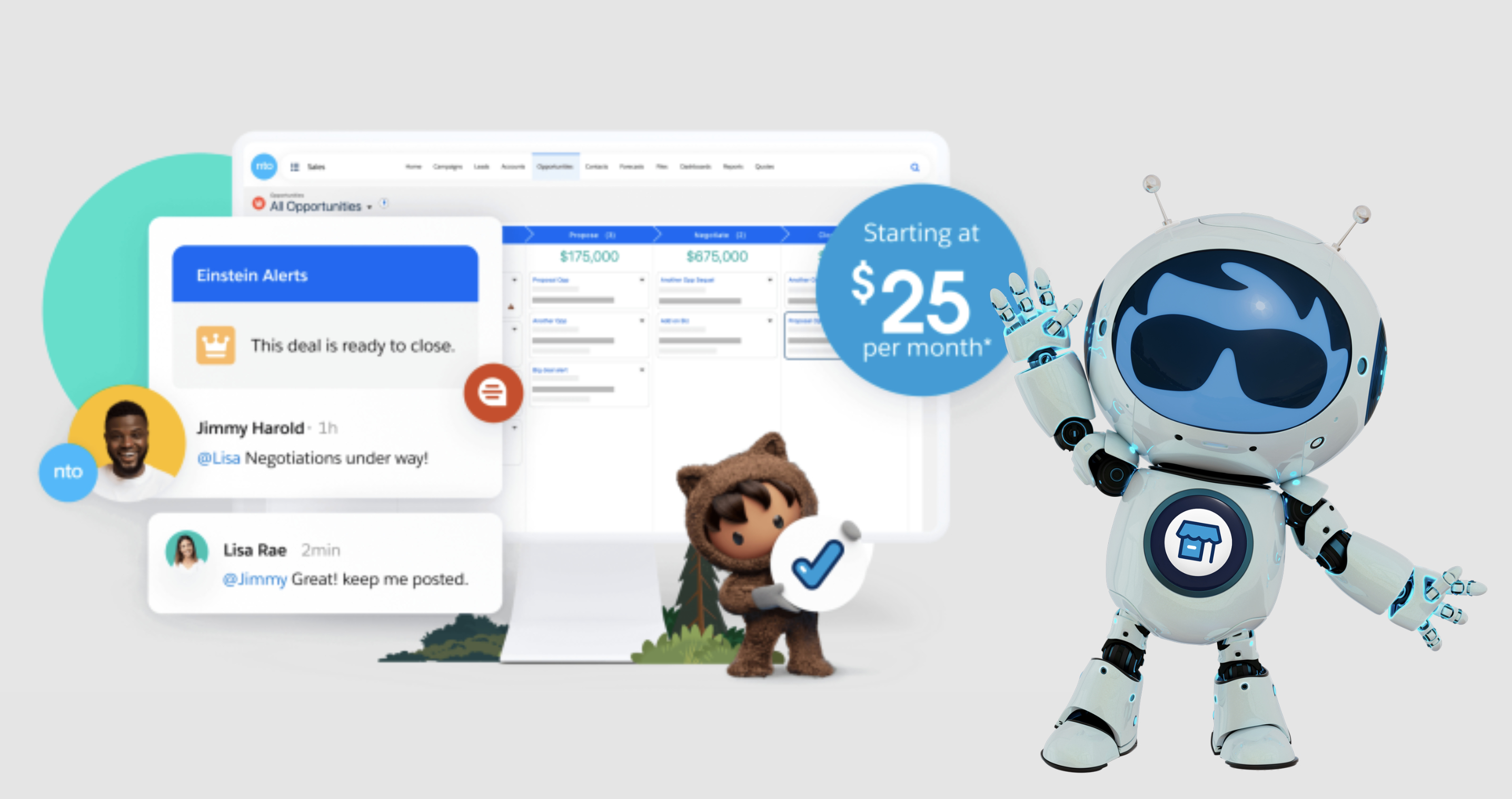For small and medium-sized businesses (SMBs), standing out in a crowded market can be difficult, especially when competing against large enterprises with a bigger budget. Today’s business buyers want more than just a good product or service: In fact, 80% say that the experience a company provides is as important as its products and services. Here are five ways small businesses can grow their impact:
What we’ll cover:
- Reach the right customers with marketing automation
- Create a sales playbook to keep your team on track
- Use AI to make smart decisions
- Triple growth with the help of partners
- Improve post-sale support with AI
1. Reach the right customers with marketing automation
Imagine having a tool that helps you reach the right person at just the right time. With the Starter Suite, you can create email campaigns that really connect with your audience.
For instance, the moment someone fills out a contact us form or engages with a chatbot, their data is saved and a thank you message is sent out. There are also email drip campaigns that send customized messages after a certain action was taken by a user, like signing up for a newsletter or downloading content. Plus, with Einstein Send Time Optimization, your emails will be sent at the best time for each person, making your marketing more effective.
Automation helps prioritize leads by scoring them based on their behavior, such as opening emails or visiting certain pages. With easy access to marketing analytics, you get a clear picture of what’s working across your campaigns. Automated emails can be triggered based on specific actions, like reminding someone about a product they checked out but didn’t buy. It can even segment contacts based on their actions, ensuring the right message is sent to the right group. And it doesn’t stop there, it can also gather post-purchase survey feedback and use it to make the customer experience even better.
AI Tools for Small Business
2. Create a sales playbook to keep your team on track
The best sports teams’ successes come from creating a plan. And just like a coach, you need to be clear about your team’s goals and expectations and lay out a sales plan to get them there. This is especially important in business-to-business (B2B) sales, where 84% of business buyers expect sales reps to act as their trusted advisors.
Develop clear sales playbooks to create a consistent process for all prospects. Here’s how to create a sales playbook, step by step:
- Define your vision: Lay out your mission, values, and how your product solves customer pain points. Include common objections and effective responses.
- Build a clear sales process: Define your target audience, key personas, and lead nurturing steps. Highlight how data analytics and tools help streamline your sales strategy.
- Keep it flexible: Think of your playbook as a living document. Regularly update it with team feedback and new insights to stay ahead.
For instance, by using AI to structure sales territories, you can avoid multiple sales teams reaching out to the same prospect with different products or opportunities. You can also set sales quotas to give your team clear goals, helping everyone stay aligned and accountable for better results.
Grow your business with AI-backed marketing tools
Reach customers across every channel, automate tasks, and personalize your marketing strategy — all with AI.



3. Use AI to make smart decisions
Artificial intelligence (AI) is now fueling small businesses, helping to advance sales, marketing, commerce, and operations. When AI and CRM work together, your teams gets the support they need to handle their workload, making it easier to keep customers happy. Customer relationship managerment (CRM) is a single source of truth for your business where all important information are stored, like product details, pricing, customer interactions, and purchase history. This helps your team to quickly find what they need and stay in sync. For example, if you need to create a proposal, you can access the latest product information directly from your CRM and generate the proposal automatically. This saves time and eliminates the need for constant back-and-forth.
Now, imagine giving your team a tool that helps them work smarter, solve problems faster, and build better relationships with customers. That’s what Agentforce does. It looks at customer data to suggest what they might need next, like recommending accessories after buying a phone It even helps your team anticipate problems before they happen, turning them into proactive problem-solvers.
4. Triple growth with the help of partners
Two heads are almost always better than one, so consider amplifying your small business growth strategies with partners. The right partnerships deliver the benefits of a bigger sales team without the downsides of increasing headcount The key is ensuring that all prospects have the same amazing experience, whether they’re talking to an in-house team or your partner.
To keep your partners and sales teams on the same page, a CRM is essential. It ensures everyone has access to the same information, whether it’s sales playbooks or customer-facing materials. For example, if your sales team is talking to a customer and your partner is also reaching out, they’ll both have the same details about pricing, features, or promotions, avoiding any confusion.
With all your data in one place, it’s easier to bring your partner teams on board. You can track both partner and in-house sales efforts in one place, see which teams are working with which prospects, and ensure everyone is using the most up-to-date marketing materials.
5. Improve post-sale support with AI
Technology, like Agentforce can do a lot to support your team, but one of its biggest perks is how it powers personalized, 24/7 customer service, even when your team’s off the clock. Agentforce provides a comprehensive, 360-degree view of each customer, consolidating all interaction history, purchase details, and service records in one place. This ensures that support agents have all the necessary information at their fingertips to address customer issues efficiently.
Together, with Starter Suite, you can automate the creation and routing of support cases. Agentforce enhances this by offering intelligent case assignment based on agent skills and availability, ensuring that each issue is handled by the best possible person.
For small businesses, you may not have your team built just yet, so utilizing AI for customer support is a solid strategy. Here are two ideas to think about:
- Create a self-service community: An AI-driven self-service community gives them quick access to helpful guides, product info, and FAQ pages. AI can predict common issues and automatically posts answers; hence quick answers are guaranteed. Plus, if things escalate, your service team gets a heads-up to jump in and help out.
- Free up your team with service agents: AI-powered chatbots are the helpful virtual assistant that never sleeps. They can handle simple questions and provide personalized help around the clock via text or chat. These AI agents have come a long way, making them a great option as your business grows. They can take care of big product catalogs and more complex service needs, so your team doesn’t get overloaded. Tools like Agentforce empower your team by combining AI and automation, helping you deliver round-the-clock customer experiences with ease.

Your small business can become big
As a small business, you have the power to scale your impact significantly by leveraging the right tools and strategies. With these five unique strategies, you’re not just growing your business — you’re scaling your impact. At Salesforce, we’re here to support you every step of the way.
Ready to scale your your business? Start with customer management tools like Starter Suite. Empower your business to grow smarter, faster, and more efficiently today.






























